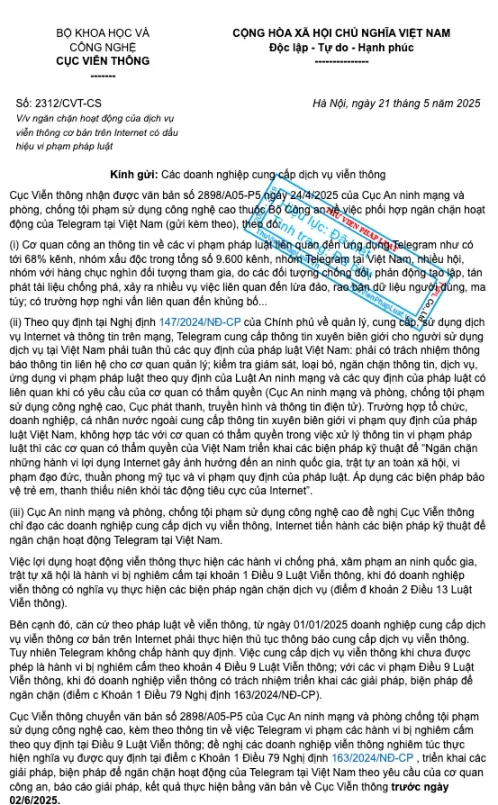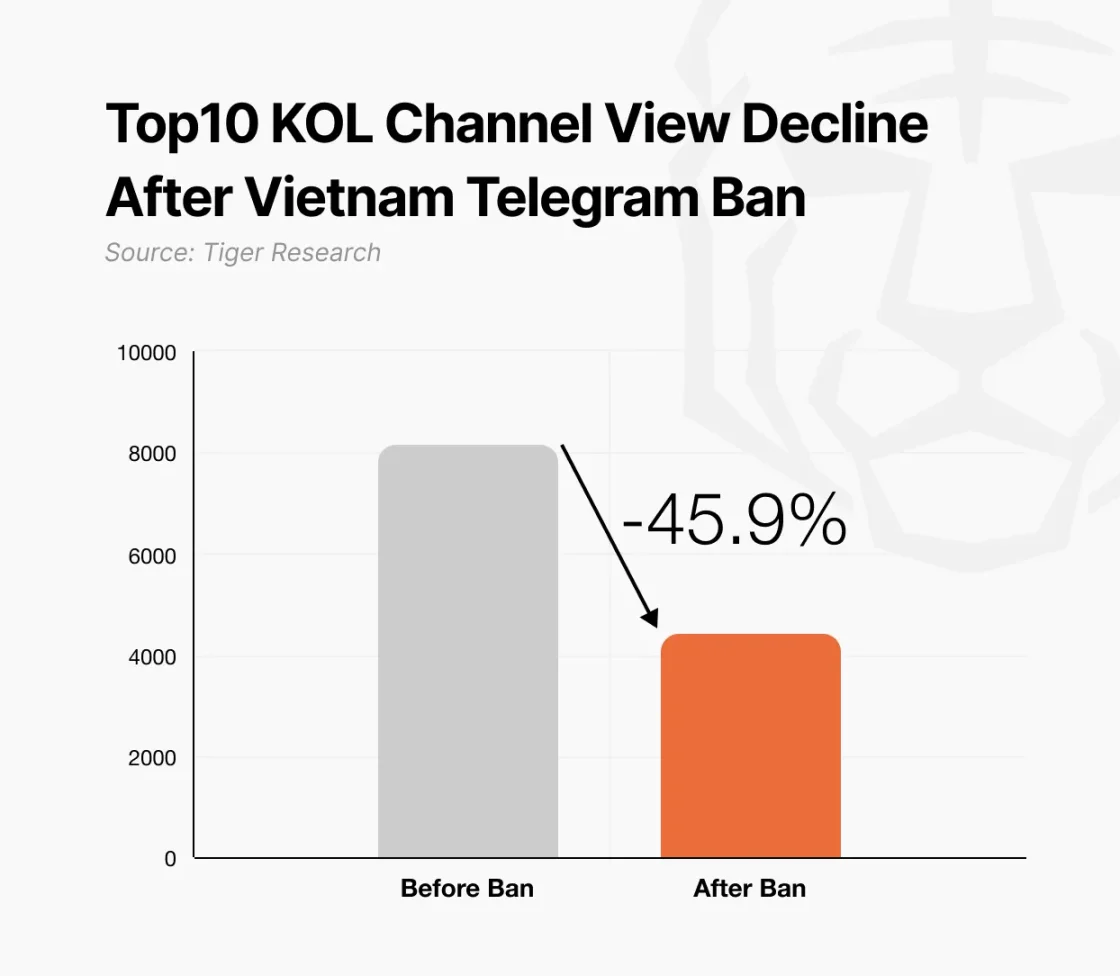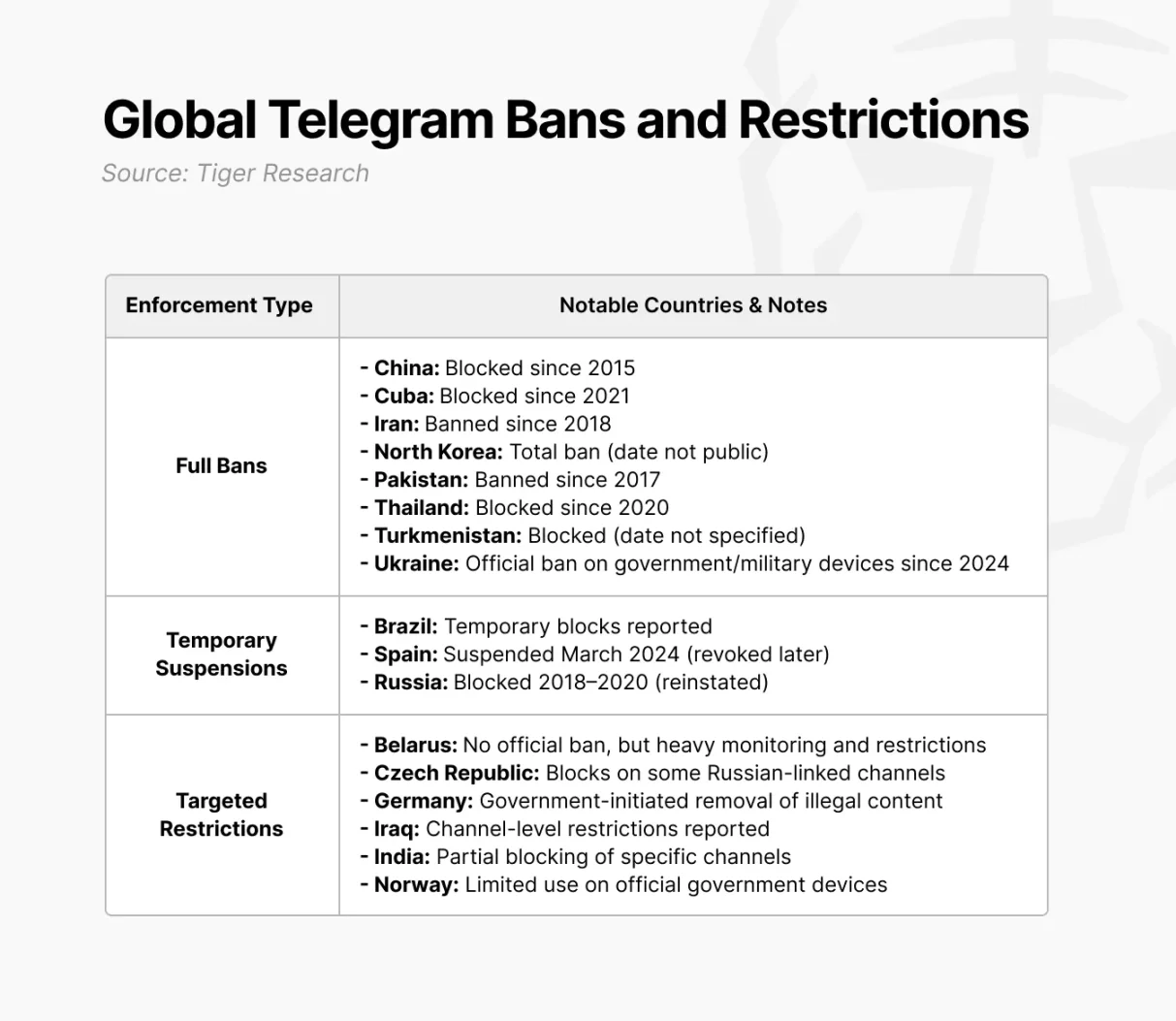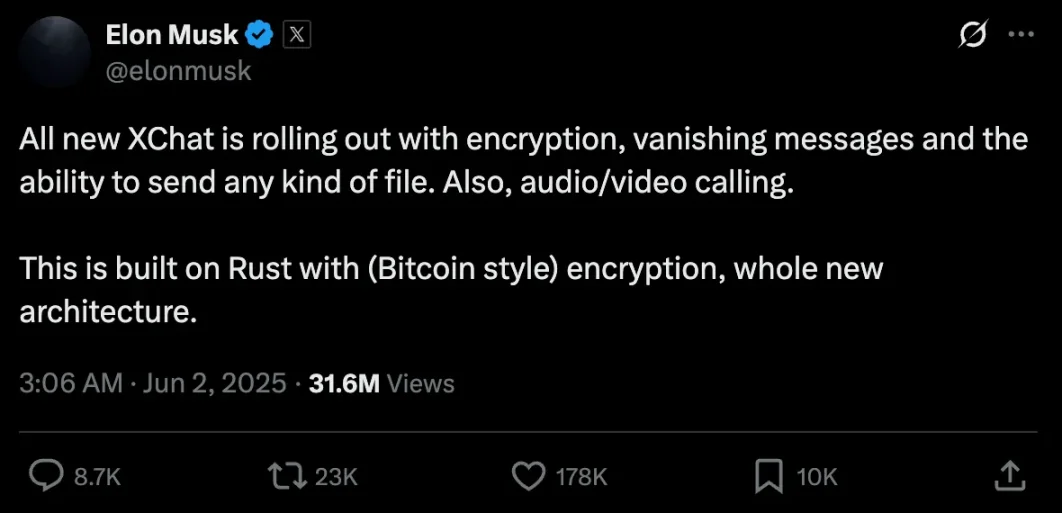Reducing over-reliance and achieving platform diversification is no longer optional; it is a necessary survival strategy.
Written by: Chi Anh and Ryan Yoon
This report, authored by Tiger Research, analyzes the hidden risks brought about by the cryptocurrency market's indispensable reliance on Telegram and examines the structural vulnerabilities exposed by Vietnam's Telegram ban.
Key Takeaways
Exposed platform dependency risks: In June 2025, Vietnam's ban on Telegram led to a 45% drop in user activity within major cryptocurrency communities in just a few days. This incident highlights a critical structural vulnerability: the cryptocurrency industry’s severe dependence on a single, irreplaceable communication platform.
Lack of viable alternatives: Although alternatives such as Discord, Signal, and local messaging apps have been explored, none can replicate the combination of global reach, privacy features, and native encrypted user experience that Telegram offers. Currently, no other platform can match this combination at scale.
Rising global regulatory pressure: Governments around the world are intensifying scrutiny of Telegram in the name of "digital sovereignty," targeting its resistance to data sharing and monitoring. However, Telegram has recently begun cooperating with authorities in certain jurisdictions, temporarily alleviating concerns in some key markets.
1. The Role of Telegram in the Cryptocurrency Market
With its strong privacy protection, scalable group chat, and bot integration features, Telegram has become the primary communication platform for the global cryptocurrency community. These features make it the preferred choice for KOLs and new projects to build communities. Market participants actively use Telegram as their main channel for interaction.
Today, Telegram plays a central role in the structure of the cryptocurrency market. Its presence is often taken for granted, but when imagining a significant event (like Token2049) without Telegram, the extent of its deep integration becomes evident—participants would turn to exchanging LinkedIn profiles. Such a scenario feels distinctly out of place. At this stage, a cryptocurrency ecosystem without Telegram is hard to imagine.
2. Vietnam's Comprehensive Ban on Telegram

The official Telegram ban order was issued on May 21. Source: thuvienphapluat
On May 21, 2025, Vietnam's Ministry of Information and Communications issued Order No. 2312/CVT-CS at the request of the Ministry of Public Security, instructing all telecom operators to block Telegram services domestically by June 2.
This move immediately triggered chaos across Vietnam's entire cryptocurrency ecosystem. Vietnam is one of the countries with the largest user base of Telegram globally, and like many other markets, its domestic cryptocurrency sector heavily relies on the platform as a primary communication channel. The ban left local cryptocurrency projects and users without viable alternatives. Although many turned to VPNs (Virtual Private Networks) to maintain access, this workaround is at best a temporary and incomplete solution.

For ordinary users with only moderate interest in cryptocurrency, accessing Telegram via VPN proved too inconvenient. As a result, many completely withdrew from participation. Within just a few days, the average traffic of the top ten cryptocurrency communities in Vietnam dropped by over 45%.

Communities are hastily turning to Discord as an alternative platform. Source: Telegram
In response, community organizers began exploring and promoting alternative platforms. Activity on Vietnamese servers on Discord surged, while some communities attempted to use local messaging apps like Zalo, aiming to cater to users seeking a lighter, simpler interface.
However, these alternatives fail to replicate the unique balance of usability, privacy, and native encryption features that Telegram offers. Despite the ban, most users still rely on Telegram through VPNs—a workaround, not a substitute.
3. Are There Viable Alternatives to Telegram?
The regulatory pressure on Telegram reveals a structural vulnerability in the cryptocurrency industry: its severe dependence on a single communication platform.
As demonstrated by the Vietnam case, the immediate response to the ban was widespread use of VPNs. While this provides a short-term workaround, it poses significant barriers for ordinary users. Although institutional participation in cryptocurrency is increasing, retail investors still account for a large portion of market activity. During a transformative period when the market is trying to move beyond its early user base, reliance on Telegram has become an obstacle to broader adoption.
This has prompted the industry to actively seek alternative platforms. Discord has become the preferred option for many Vietnamese communities, offering real-time communication and a developer-friendly environment. However, it lacks the mobile-first simplicity that Telegram provides. Another candidate, Signal, promotes strong security features but offers limited tools for native encrypted use cases—making it an incomplete alternative.

Source: Similarweb
Other messaging apps, such as Zalo or WhatsApp, often have user bases limited to specific regions. This makes them inherently misaligned with the global nature of the cryptocurrency ecosystem, which inherently requires cross-border communication.
Ultimately, the cryptocurrency industry has yet to find a viable alternative to Telegram. While its technological advantages, such as anonymity, privacy, and bot integration, continue to keep it dominant, the fundamental issue lies in its structural nature.
Currently, there is no widely adopted communication platform that can operate seamlessly across borders. Given the varying communication preferences of different countries, finding a single alternative that meets the global needs of the cryptocurrency ecosystem remains a significant challenge.
Telegram occupies a rare position in the communication space. It does not dominate any single national market, and for many users, it is not their primary app. However, in many different regions, it is often the second most used communication tool. This unique status as a universal secondary platform gives Telegram a de facto neutrality that transcends borders. It is precisely this region-agnostic status that makes it so difficult to replace.
4. The Growing Regulatory Risks Surrounding Telegram
Despite the lack of viable alternatives, governments around the world, including Vietnam, are intensifying scrutiny of Telegram in the name of "digital sovereignty."
This is largely due to Telegram's strong privacy policies and its general refusal to share user data (with few exceptions for major jurisdictions). For many governments, the inability to monitor encrypted communications on the platform remains a core concern.

These concerns are increasingly translating into regulatory actions. Countries that have already taken measures against Telegram typically follow one of three strategies. The first is a comprehensive ban, often accompanied by efforts to promote domestic alternatives. The second involves implementing temporary blocks in response to specific events (such as legal non-compliance or election-related tensions). The third is selective filtering, where the government allows access to the app but blocks specific channels or limits its speed.
The precedents set by these cases suggest that more restrictions may be forthcoming. Several countries are currently considering implementing comprehensive or partial bans on Telegram. While the political reasons vary from country to country, the regulatory patterns are becoming more consistent. Governments typically justify their controls on grounds of national security, non-compliance with local laws, or risks to public order.
In this context, how Telegram responds is becoming a key variable. Although the triggers vary by jurisdiction, the fundamental issue remains the same: Telegram's unwillingness or inability to meet local compliance requirements. In countries with stricter regulatory environments, tolerance for non-cooperative platforms has significantly decreased.
However, there are signs that Telegram's strategy is shifting. Following the arrest of CEO Pavel Durov, the company has begun taking steps to enhance compliance. A notable example is its release of a transparency report disclosing the IP addresses and phone numbers of violators, but this is limited to jurisdictions with strong democratic institutions.
Despite the limited scope, Telegram now shows more willingness to cooperate with government demands than in the past. This shift is expected to reduce the risk of facing immediate sanctions in major markets (such as the United States).
5. What If Telegram Were Completely Banned?
The likelihood of a global ban on Telegram remains low, but the concerns of governments are real and growing. If such a situation were to occur, users' initial reactions might be similar to the Vietnam case, with an increase in VPN usage. However, as mentioned above, this approach is merely a short-term workaround.

If a comprehensive ban were to happen, users would begin migrating to alternative services. As previously discussed, the most viable alternatives are not clones of Telegram or local messaging apps. Platforms that possess Telegram's regionally neutral characteristics are more likely to gain attention.
Signal, which has seen a recent uptick in adoption, is a potential candidate. However, a stronger competitor may be X's upcoming messaging service, XChat. Given X's deep integration with the cryptocurrency community, XChat could leverage its existing user base for a strong market entry.
However, the more immediate risk lies in the potential impact on the TON Foundation. Although the TON Foundation is officially separate from Telegram, the two are closely related. Telegram's native T2E (Telegram to Earn) games have been central to the growth of the TON ecosystem. The ease of using the TON wallet directly within the Telegram interface is also a key advantage.
The expansion of ban measures turns this integration into a risk point. If access to Telegram is blocked, user acquisition and transaction flow for applications integrated with TON will be immediately affected. Even if the blockchain continues to operate normally, the impact remains. As the market views Telegram and TON as a unified platform, TON-based projects face direct reputational and operational risks.
While the likelihood of a global ban on Telegram is low, the industry must confront a reality: viable alternatives are limited. More broadly, the cryptocurrency ecosystem relies not only on Telegram but also on multiple single points of service within its infrastructure. If these structural vulnerabilities are not addressed, the industry will continue to be exposed to sudden, external shocks.
The path forward is clear. Reducing over-reliance and achieving platform diversification is no longer optional. It is a necessary survival strategy.
免责声明:本文章仅代表作者个人观点,不代表本平台的立场和观点。本文章仅供信息分享,不构成对任何人的任何投资建议。用户与作者之间的任何争议,与本平台无关。如网页中刊载的文章或图片涉及侵权,请提供相关的权利证明和身份证明发送邮件到support@aicoin.com,本平台相关工作人员将会进行核查。




